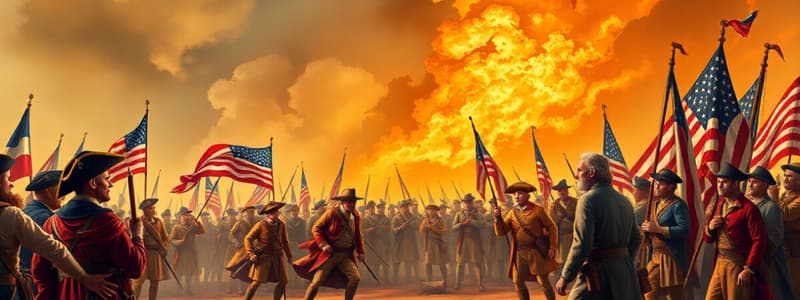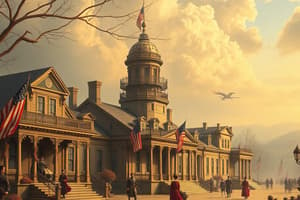Podcast
Questions and Answers
What action does the Judicial branch perform in relation to laws?
What action does the Judicial branch perform in relation to laws?
Which of the following best describes the system of checks and balances?
Which of the following best describes the system of checks and balances?
What consequence did the Indian Removal Act have on Native Americans?
What consequence did the Indian Removal Act have on Native Americans?
How did the invention of the cotton gin impact the institution of slavery?
How did the invention of the cotton gin impact the institution of slavery?
Signup and view all the answers
What was one reason for the secession of Southern states?
What was one reason for the secession of Southern states?
Signup and view all the answers
Who was the leader of the British forces during the revolutionary war?
Who was the leader of the British forces during the revolutionary war?
Signup and view all the answers
What event is described as resulting in colonists throwing snowballs and rocks at British soldiers?
What event is described as resulting in colonists throwing snowballs and rocks at British soldiers?
Signup and view all the answers
Which amendment protects citizens from unreasonable searches and seizures?
Which amendment protects citizens from unreasonable searches and seizures?
Signup and view all the answers
What term describes the colonists' grievances against the British government?
What term describes the colonists' grievances against the British government?
Signup and view all the answers
What role does the executive branch have in the government?
What role does the executive branch have in the government?
Signup and view all the answers
Which of the following rights is not protected by the Bill of Rights?
Which of the following rights is not protected by the Bill of Rights?
Signup and view all the answers
What does the preamble primarily state about government?
What does the preamble primarily state about government?
Signup and view all the answers
Who is responsible for making laws in the government?
Who is responsible for making laws in the government?
Signup and view all the answers
Study Notes
Revolutionary War
- Fought between: British soldiers and American colonists.
- British leader: King George III.
- Colonial leader: George Washington.
- Boston Massacre: Colonists threw snowballs/rocks at British soldiers, who fired, resulting in deaths/injuries. Taxation was a contributing factor.
- Colonial Representation: Colonists lacked representation in British government.
- Paul Revere's depiction: Artwork used to portray British aggression and incite rebellion against the Crown.
- Preamble: Outlined natural rights (life, liberty, pursuit of happiness) and the right of revolution if government fails to protect these rights.
- Grievances: Detailed injustices inflicted by the British government.
- Denunciation: Formal declaration of independence from Britain.
US Constitution
-
Constitution: The fundamental law of the United States.
-
Bill of Rights: First 10 amendments, guaranteeing rights against government intrusion.
-
Importance of Bill of Rights: Protects fundamental rights, such as freedom of speech, religion, assembly; the right to bear arms; freedom from unreasonable searches.
-
1st Amendment: Freedom of speech, religion, assembly.
-
2nd Amendment: Right to bear arms.
-
3rd Amendment: No forced quartering of soldiers.
-
4th Amendment: Protection against unreasonable searches and seizure (requires warrant).
-
5th Amendment: Protection against double jeopardy, self-incrimination, and the taking of property without fair compensation, due process.
-
6th Amendment: Rights of the accused in criminal prosecutions (speedy trial, impartial jury, etc.).
-
8th Amendment: Protection against cruel and unusual punishment, fair bail.
Branches of US Government
- Legislative Branch: Congress (House of Representatives and Senate).
- Legislative function: Makes laws, declares war, and approves treaties.
- Executive Branch: President, Vice President, and Cabinet.
- Executive function: Enforces laws, commands armed forces, and negotiates treaties.
- Judicial Branch: Supreme Court of the United States.
- Judicial function: Interprets laws, determines the constitutionality of laws.
- Congress Representation: 535 members (based on state population). Two senators per state (6-year terms); members of the House based on state population (2-year terms).
- Checks and Balances: System preventing any one branch from becoming too powerful due to overlapping powers and veto/approval processes.
Manifest Destiny and Conflict
- Manifest Destiny: Belief in the inherent right/necessity of American expansion to the Pacific.
- Native American Experience: Forced removal from ancestral lands (e.g., Trail of Tears). Indian Removal Act.
- Conflict: Forced removals led to significant conflict, displacement, and loss for Native American populations.
Cotton Gin and Slavery
- Cotton Gin's Impact: Increased cotton production, leading to a rise in demand for enslaved labor.
- Effect on Slavery: Increased demand for enslaved labor contributed to the growth and intensification of slavery.
Causes of the Civil War
- Primary cause: Issue of slavery.
- Secession: Southern states seceded due to disagreements over slavery and states' rights, forming the Confederacy.
The Civil War and Tactics
- Union and Confederacy's Pre-War Expectations: Expectation of a short war.
- Sherman's Atlanta Campaign: Campaign involved capturing Atlanta and destroying infrastructure. Part of larger strategy of "total war."
Studying That Suits You
Use AI to generate personalized quizzes and flashcards to suit your learning preferences.
Description
Explore the key events and principles of the American Revolutionary War and the foundational aspects of the US Constitution. This quiz covers significant figures, events like the Boston Massacre, and the importance of the Bill of Rights. Test your knowledge on how these elements shaped American democracy.




